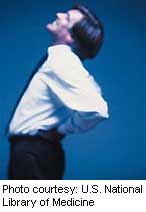
THURSDAY, Aug. 9 (HealthDay News) — Workers on medical leave because of lower back pain are more likely to return to work if they receive reassurance and medical advice on how to stay active, according to a new study.
People with nonspecific lower back pain who avoid activity could delay their recovery, say researchers Dr. Marc Du Bois and Peter Donceel, at KU Leuven, a university in Belgium.
Their study involved more than 500 workers — mostly blue-collar — on sick leave because of low back pain. Workers who had symptoms of a serious back problem were not included.
The study was published in the Aug. 1 issue of Spine.
The researchers randomly selected half of the workers to receive information and advice on their condition. Specifically, these workers were told their pain would likely resolve over time. They were also advised to avoid bed rest, to remain active and continue with their normal daily routine.
The remaining participants did not receive this information and advice and were only given a standard disability evaluation.
Workers who were educated about back pain and reassured that they would get better were more likely to return to work. After one year, the study showed, only 4 percent of these workers had not done so. In comparison, 8 percent of those who did not receive the counseling on back pain remained on leave.
The researchers found that the 38 percent of those who were given the advice on back pain had repeated episodes of medical leave, compared with 60 percent of those who did not receive this advice.
“Combined counseling and disability evaluation by a medical advisor results in a higher return to work rate due to a lower sick leave recurrence as compared to disability evaluation alone,” the study’s authors wrote in a journal news release.
Advice on low back pain should be part of routine disability evaluations to prevent it from becoming a chronic and disabling condition, the authors concluded, and this advice should be provided within six weeks of a worker going out on medical leave.
More information
The U.S. National Institutes of Health has more about back pain.

